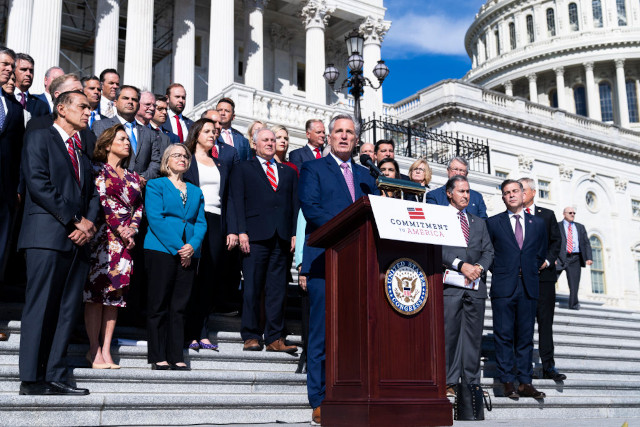
Over the past 40 years, the middle class has experienced a steady decline, both in terms of economic stability and social influence. This period has been marked by a growing wealth gap, stagnant wages, and a shrinking middle class.
The GOP has played a significant role in the erosion of the middle class, often implementing policies that favor the wealthy elite at the expense of the majority. This political agenda has contributed to the disenfranchisement and disillusionment of middle-class Americans.
The impact of political manipulation on society is far-reaching, leading to increased polarization and a lack of trust in political institutions, further exacerbating the struggles of the middle class.
The Republican establishment's strategy
The GOP has often relied on deceit and manipulation to win elections, employing tactics such as gerrymandering and voter suppression to maintain power. These strategies have disproportionately affected middle-class and minority voters.
Disingenuous wedge issues, such as immigration, gun control, and abortion, have been used to divert public attention away from pressing economic issues and create an illusion of choice in the political landscape. This has allowed the wealthy elite to continue profiting at the expense of the middle class.
By exploiting the middle class, well-heeled benefactors have amassed even greater wealth, widening the income inequality gap and further disenfranchising the majority of Americans.
The 2005 housing collapse and its consequences
The housing collapse was caused in part by dishonest mortgage underwriting and rampant mortgage securities speculation. Lax regulation and predatory lending practices led to a housing bubble that ultimately burst, with devastating consequences for the middle class.
The middle class and minority communities were disproportionately affected by the collapse, with many losing their homes and life savings. The fallout from the crisis continues to impact these groups to this day.
As a result of the housing collapse, many middle-class families were forced to rely on their retirement savings for daily expenses, jeopardizing their long-term financial stability.
The Pandemic's Effects on the Middle Class
During the COVID-19 pandemic, the middle class faced numerous challenges, including job losses, reduced income, remote work struggles, mental health issues, education disruptions, reduced access to healthcare, housing instability, savings depletion, small business closures, increased reliance on government assistance, and widening income inequality. These factors further exacerbated the existing struggles of the middle class, revealing the fragility of their economic position and the urgent need for policy changes to address these issues.
Education as a fading equalizer
Higher education has become increasingly inaccessible for low-income individuals due to rising tuition costs and stagnant financial aid. This has led to a growing gap in educational attainment between the rich and the middle class, limiting opportunities for upward mobility.
The student loan crisis has left many middle-class graduates burdened with enormous debt, hindering their ability to achieve financial stability and contribute to the economy. This long-term issue is further weakening the prospects of the middle class.
The wealthy elite have shown a disinterest in maintaining a well-educated middle class, viewing it as an unnecessary expense rather than an investment in the future of society. This mindset has contributed to the decline in educational opportunities for middle-class Americans.
As a result of these factors, upward mobility has been in decline, making it increasingly difficult for middle-class individuals to improve their economic situation and achieve the American
The decline of ethics in politics and business
The influence of wealth on Congress and Big Media has led to a political landscape that prioritizes the interests of the wealthy elite over those of the middle class. This has resulted in policies and narratives that perpetuate inequality and disenfranchisement.
Manipulative tactics, such as disinformation campaigns, lobbying, and astroturfing, have been used to maintain power and control over the political and economic landscape. These tactics undermine democratic processes and further marginalize middle-class Americans.
The moral bankruptcy of modern political and business practices has led to widespread disillusionment and cynicism, eroding public trust in institutions and weakening the social fabric of society.
Theories and speculations on the middle class decline
Numerous theories have been proposed to explain the decline of the middle class, ranging from well-meaning analyses to outlandish conspiracy theories. These explanations often reflect the complexity and uncertainty of the issue, as well as the pervasive sense of confusion and disorientation experienced by many middle-class Americans.
The wealthy elite's increasing disregard for the middle class has become increasingly apparent, as they continue to amass wealth and power while the majority of Americans struggle to make ends meet. This trend highlights the growing divide between the rich and the rest of society.
The visible results of the ongoing Economic Class War include skyrocketing wealth inequality, reduced social mobility, and the hollowing out of the middle class. These consequences have far-reaching implications for the future of American society.
The next targets of the wealthy elite
The Affordable Care Act (ACA) has come under attack from those who seek to dismantle social safety nets and further erode access to healthcare for middle-class Americans.
Medicaid and Medicare, crucial programs that provide healthcare to millions of Americans, are also being targeted for cuts and privatization efforts, which would disproportionately affect the middle class and the elderly.
Social Security, the ultimate prize for those seeking to undermine social welfare programs, faces threats of privatization and benefit reductions, jeopardizing the retirement security of millions of middle-class Americans.
The urgent need for change to protect the middle class cannot be overstated. Policymakers must prioritize the interests of the majority of Americans and implement policies that promote economic stability, social mobility, and access to essential services such as healthcare and education.
Awareness and political engagement are crucial in the fight to reverse the decline of the middle class. Citizens must hold their elected representatives accountable and demand policy changes that address the root causes of inequality and middle-class struggles.
The potential consequences of continued inaction include further erosion of the middle class, increased social unrest, and the decline of American democracy. It is incumbent upon all stakeholders to recognize the severity of the situation and take meaningful action to restore hope and opportunity for the middle class.
About the Author
 Robert Jennings is the co-publisher of InnerSelf.com, a platform dedicated to empowering individuals and fostering a more connected, equitable world. A veteran of the U.S. Marine Corps and the U.S. Army, Robert draws on his diverse life experiences, from working in real estate and construction to building InnerSelf with his wife, Marie T. Russell, to bring a practical, grounded perspective to life’s challenges. Founded in 1996, InnerSelf.com shares insights to help people make informed, meaningful choices for themselves and the planet. More than 30 years later, InnerSelf continues to inspire clarity and empowerment.
Robert Jennings is the co-publisher of InnerSelf.com, a platform dedicated to empowering individuals and fostering a more connected, equitable world. A veteran of the U.S. Marine Corps and the U.S. Army, Robert draws on his diverse life experiences, from working in real estate and construction to building InnerSelf with his wife, Marie T. Russell, to bring a practical, grounded perspective to life’s challenges. Founded in 1996, InnerSelf.com shares insights to help people make informed, meaningful choices for themselves and the planet. More than 30 years later, InnerSelf continues to inspire clarity and empowerment.
Creative Commons 4.0
This article is licensed under a Creative Commons Attribution-Share Alike 4.0 License. Attribute the author Robert Jennings, InnerSelf.com. Link back to the article This article originally appeared on InnerSelf.com



